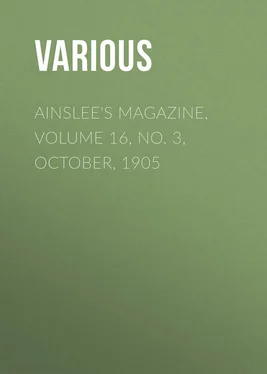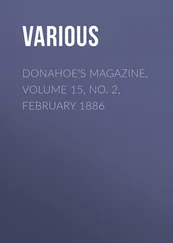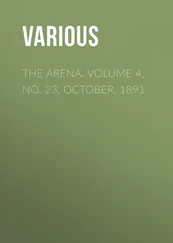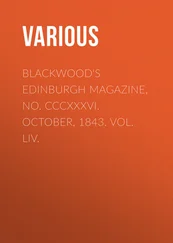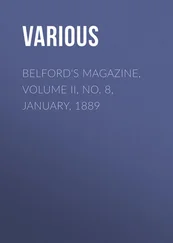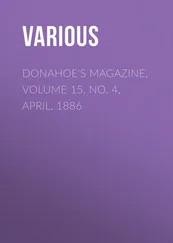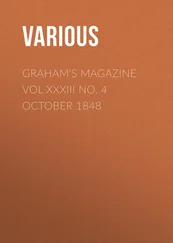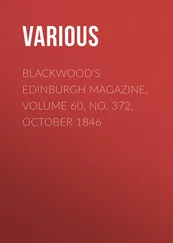Various - Ainslee's magazine, Volume 16, No. 3, October, 1905
Здесь есть возможность читать онлайн «Various - Ainslee's magazine, Volume 16, No. 3, October, 1905» — ознакомительный отрывок электронной книги совершенно бесплатно, а после прочтения отрывка купить полную версию. В некоторых случаях можно слушать аудио, скачать через торрент в формате fb2 и присутствует краткое содержание. Издательство: Иностранный паблик, Жанр: periodic, literature_20, Поэзия, foreign_poetry, short_story, на английском языке. Описание произведения, (предисловие) а так же отзывы посетителей доступны на портале библиотеки ЛибКат.
- Название:Ainslee's magazine, Volume 16, No. 3, October, 1905
- Автор:
- Издательство:Иностранный паблик
- Жанр:
- Год:неизвестен
- ISBN:нет данных
- Рейтинг книги:5 / 5. Голосов: 1
-
Избранное:Добавить в избранное
- Отзывы:
-
Ваша оценка:
- 100
- 1
- 2
- 3
- 4
- 5
Ainslee's magazine, Volume 16, No. 3, October, 1905: краткое содержание, описание и аннотация
Предлагаем к чтению аннотацию, описание, краткое содержание или предисловие (зависит от того, что написал сам автор книги «Ainslee's magazine, Volume 16, No. 3, October, 1905»). Если вы не нашли необходимую информацию о книге — напишите в комментариях, мы постараемся отыскать её.
Ainslee's magazine, Volume 16, No. 3, October, 1905 — читать онлайн ознакомительный отрывок
Ниже представлен текст книги, разбитый по страницам. Система сохранения места последней прочитанной страницы, позволяет с удобством читать онлайн бесплатно книгу «Ainslee's magazine, Volume 16, No. 3, October, 1905», без необходимости каждый раз заново искать на чём Вы остановились. Поставьте закладку, и сможете в любой момент перейти на страницу, на которой закончили чтение.
Интервал:
Закладка:
“ We saw, anyway, that we were just being used as stepping-stones to higher things,” she went on; “so we thought we might as well come in with Mr. Hastings.”
She sank gracefully down on one end of a large divan, and drew her skirts aside with a gesture that assumed matter-of-factly that Bobbins would occupy the other half of the seat. He justified the conclusion with a promptness which left no doubt that he regarded it as a heaven-sent opportunity.
“Not that we minded being an angels’ ladder,” he asserted, cheerfully, “but I thought from Hastings’ cast of countenance that he might be going to give you a few scenes from ‘Hamlet,’ and I didn’t think it was safe to be sitting behind a curtain when he got to that part about Polonius .”
Velantour regarded them with that awe which a Frenchman must feel for the rollicking frivolity of the American young and the placid inefficiency of the American parent.
Meantime Hastings had made his way to Elenore and slipped into a vacant chair by the tea table, as a matter of course.
She smiled at him very charmingly.
“You’re late,” she said, “and you were coming early, you know. Do you think you deserve caravan tea with a dash of burgundy in it?”
“I think I deserve all the good things I can get to-day,” he said, and though his tone was light, there was an undertone that suggested that he meant it.
“It tastes to me more like burgundy with a dash of caravan tea,” said Mrs. Van Velt. “After a while they will forget to put in the tea at all.”
“And then, Monsieur Velantour?” said Carrington, amusedly; for the old Frenchman was sipping the mixture cautiously.
“Then it will not need mademoiselle’s hands to make it perfection,” said Velantour, with a humorous twist of his keen old lips.
His gray eyes gleamed as they applauded him laughingly. Age had intensified in him the love of appreciation which is innate in the Gallic heart.
“While we have tea, let us have toast,” said Bobbins, promptly. “I propose a toast to Monsieur Velantour. Turn it into rhyme, Ned. You’re a crack improvisatore .”
Carrington stood up, with the easy grace of an Italian. He had the temperament of a troubadour, and he loved in turn a compliment.
“To Monsieur Velantour” (he began) “whose name
Is but a synonym for fame – ”
He had the improvisatore’s trick of lingering on the final syllable until it brought its own suggestion.
“Bravo!” they applauded him; while Velantour enjoyed the adulation with the frankness of a child.
“So irresistible that Art” (he glanced with gay raillery at Velantour)
“Quite womanlike, has lost her heart.
Yet knows it in his keeping, sure.
A health to Monsieur Velantour!”
They drank it in hilarious mood.
Velantour was on his feet the next instant.
“If I could but make one littl’ Americain verse,” he implored, expansively. “But I speak so poorly. You mus’ help me a littl’.”
“Well,” said Mrs. Van Velt, practically, “you have to begin with the street he lives on, or something like that. Rue Boissonade – ” she began, and halted.
“Shall have its Claude,” suggested Bobbins.
“ Bon! ” cried Velantour. “Now I have it.
“ Rue Boissonade
Shall have its Claude ,
And l’Amerique
The new Van Dyck .”
His naïf delight was contagious.
He patted Carrington’s arm affectionately.
“But we shall paint, cher Edouard!” he said, fondly. “And you are quite ready?”
“More than ready,” laughed Carrington.
He glanced at the little clock on the mantel.
“And our train goes in just two hours,” he whispered, triumphantly.
“Till then,” said Velantour, gayly. Then he crossed over to Elenore. “Mademoiselle, I will guard your brother as though he was – what is mos’ perishable in English – a bubbl’, is it not? Madame” – he bowed to Mrs. Van Velt. “Mademoiselle” – he inclined to Carol. “In two littl’ hours,” he called to Carrington from the doorway, and was gone.
“Isn’t he the dearest thing?” Carol demanded, frankly, of Bobbins.
“He’s an old brick, but not my idea of the dearest thing,” that discriminating individual replied, promptly. “I don’t suppose you could guess what my idea would be,” he insinuated.
“Oh, that’s too much of an antique,” said Miss Van Velt, with crushing promptness.
“Antique! I bought it this year,” said Bobbins, tacking, unharmed.
“Then some one is selling you back numbers,” Miss Van Velt assured him. “Try to get your money back. It’s been taking candy from children, and it ought to be stopped.”
“The police won’t give it back,” said Bobbins, mysteriously.
“The police!” said Miss Van Velt, startled. “What have they to do – ”
“With my Mercedes?” said Bobbins, cheerfully. “That’s just the attitude I’ve tried to take with them. But it has cost me five hundred francs this week, and this is only Wednesday. The dearest thing on earth to me is Mercedes, my Mercedes,” he hummed, pathetically.
“You naturally would lavish your young affection on machines,” Miss Van Velt remarked, cruelly, but she gave him a look of decided favor.
“So long as you think I am in the running,” said Bobbins, placidly.
The maid had brought in a letter with an American postmark. Carrington held it in his hand as he crossed over to join the group around the tea table.
Mrs. Van Velt was enjoying her usual volubility, and Hastings was paying her the flattery of an apparent attention and a comprehendingly amused smile, while his eyes gave the deeper homage of frequent and involuntary glances to Elenore.
For him, at least, Elenore was the central figure. Nor was it only for him. Things were quite apt to gravitate around Elenore. Ned himself did not overshadow his twin. If there is any truth in theosophic theories, she had an unusually powerful aura; if we discard the esoteric for the exoteric, beauty and wit and reserve force, cast in the mold of an alluring femininity, are quite as attractive as the same buoyant youth, plus tremendous talent, in masculine fiber.
Elenore had, too, a certain firm, keen grasp on the realities of life which Carrington, with all his localized talent, lacked. One felt that she would not fail in any qualm, that she would not be daunted by any obstacle, that in crises she would think not of surrender or sacrifice, but of resource and expedient.
Mrs. Van Velt was concluding her story of a recent tea given for a famous woman novelist.
“ Did she talk about her work?” she exclaimed. “She never got away from her books, and she drenched us with her successes until our ardor was more than dampened. It was soaked. She gave us to understand that she had Browning beaten on obscurity, Ibsen on subtlety, and Maeterlinck on imagination. And when she left there was a heavy silence for a minute, and then Alec Carter said: ‘Now let’s talk nursery rhymes for a while. We might begin on “Little bas bleu , come blow your horn.”’”
She made her adieux on the strength of that, collecting her purse, her feather boa and her daughter from different parts of the room, with surprising promptitude.
It was her practice to save her best rocket for the last, and disappear in the glory of its swish.
Bobbins accompanied the Van Velts to their carriage, and, to misquote long-suffering Omar, once departed, he returned no more.
Carrington turned to Hastings the moment they were out of the door.
“You’ll excuse me if I read dad’s letter, won’t you? My time is getting so short,” he said, apologetically; and went over to one of the long windows to get the benefit of its light.
Читать дальшеИнтервал:
Закладка:
Похожие книги на «Ainslee's magazine, Volume 16, No. 3, October, 1905»
Представляем Вашему вниманию похожие книги на «Ainslee's magazine, Volume 16, No. 3, October, 1905» списком для выбора. Мы отобрали схожую по названию и смыслу литературу в надежде предоставить читателям больше вариантов отыскать новые, интересные, ещё непрочитанные произведения.
Обсуждение, отзывы о книге «Ainslee's magazine, Volume 16, No. 3, October, 1905» и просто собственные мнения читателей. Оставьте ваши комментарии, напишите, что Вы думаете о произведении, его смысле или главных героях. Укажите что конкретно понравилось, а что нет, и почему Вы так считаете.
